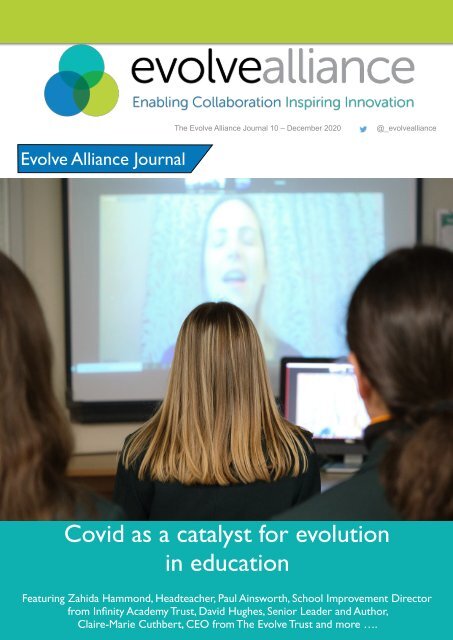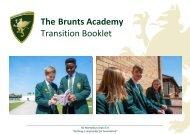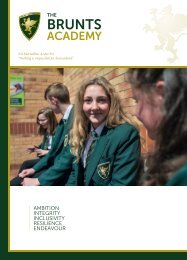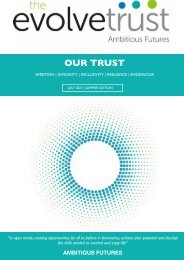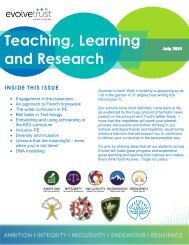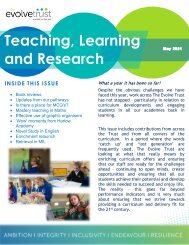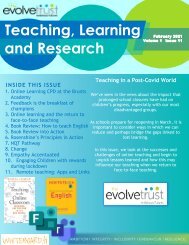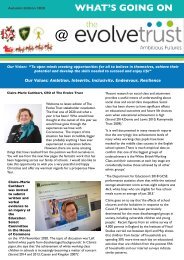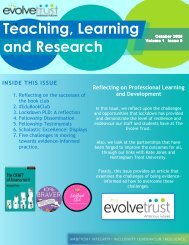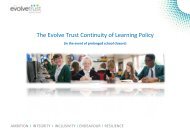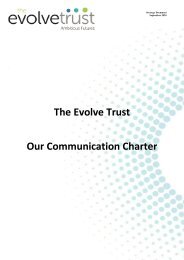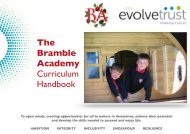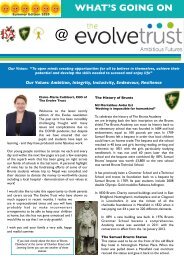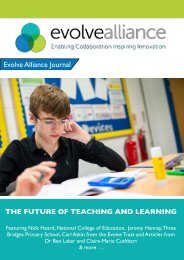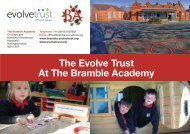Evolve Alliance Journal Autumn Term 2020
Evolve Alliance
Evolve Alliance
Create successful ePaper yourself
Turn your PDF publications into a flip-book with our unique Google optimized e-Paper software.
The <strong>Evolve</strong> <strong>Alliance</strong> <strong>Journal</strong> 10 ‒ December <strong>2020</strong><br />
@_evolvealliance<br />
<strong>Evolve</strong> <strong>Alliance</strong> <strong>Journal</strong><br />
Covid as a catalyst for evolution<br />
in education<br />
Featuring Zahida Hammond, Headteacher, Paul Ainsworth, School Improvement Director<br />
from Infinity Academy Trust, David Hughes, Senior Leader and Author,<br />
Claire-Marie Cuthbert, CEO from The <strong>Evolve</strong> Trust and more ….
Covid as a catalyst for<br />
evolution in education<br />
<br />
• Values and Culture - Policy-led v Values-led Schools by Zahida Hammond, Headteacher<br />
• Vision, Values and Culture by Paul Ainsworth, School Improvement Director<br />
• Steering Culture and Values by David Hughes<br />
• Covid as a Catalyst for Evolution in Education, Claire-Marie Cuthbert<br />
• Book Review: Legacy by James Kerr by Dawn Pare, Community Engagement and<br />
Marketing Lead, The <strong>Evolve</strong> Trust<br />
• Article written for the Education Select Committee by Claire-Marie Cuthbert on ‘left<br />
behind white pupils from disadvantaged backgrounds’.
Covid as a catalyst for<br />
evolution in education<br />
Welcome to the tenth edition of the <strong>Evolve</strong><br />
<strong>Alliance</strong> <strong>Journal</strong><br />
Welcome to the tenth edition of the <strong>Evolve</strong> <strong>Alliance</strong> journal -<br />
Covid as a catalyst for evolution in education - is Covid-19 the<br />
turning point education needs?<br />
We need to completely reimagine education. Instead of learning<br />
to memorise facts and figures, students need to “learn how to<br />
learn” and how to solve problems. Also, they should be allowed<br />
to learn independently. Changes are needed at every level. You<br />
have to infuse things like entrepreneurship into the curriculum<br />
because with the disruption that’s going on, many people are<br />
going to have to create their own jobs.<br />
We may end up in a world in which people are more likely to be<br />
autonomous contractors than to have a secure job lasting for a<br />
lifetime. We need to completely reframe the system of<br />
education based on where the world is going, instead of<br />
continuing to do the same thing over and over again. The<br />
world’s big problems will not be solved by looking at only one<br />
discipline. They’re solved at the intersection of disciplines. What<br />
we believe is that instead of giving people a menu of academic<br />
disciplines, we should give them a menu of problems and<br />
challenges that the world is facing, and then have them pick one<br />
of them and curate their learning experience around solving<br />
those problems. The end goal is to impart methods of learning<br />
rather than pure content. Let’s teach them to solve problems<br />
rather than memorise facts and figure. It’s about creating<br />
problem solvers, because problem-solving will always be relevant even as the world changes. Even when a<br />
machine makes your job obsolete – if you’re a problem solver, you’ll still have relevance in the world.<br />
CEO of The <strong>Evolve</strong> Trust<br />
2<br />
<strong>Journal</strong> 10 / December <strong>2020</strong> @_evolvealliance evolve alliance@evolvetrust.org
Covid as a catalyst for<br />
evolution in education<br />
Values and Culture - Policy Led v Valuesled<br />
Schools - Zahida Hammond<br />
It takes great courage to avoid the temptation to implement a<br />
framework of policies that ‘tick a box’ and affect a surface level<br />
of change in an organisation. It takes confidence to incrementally<br />
develop the culture in a school and affect a deeper level of<br />
change and commitment in all stakeholders.<br />
The Social Mobility Commission report “low income pupil<br />
progress at secondary” (February 2017), concluded in one of its<br />
key recommendations that ‘MAT’s should recruit headteachers who<br />
take a long-term view of school improvement and who prioritise<br />
developing school culture.’<br />
The challenge for many leaders is to reconcile this<br />
recommendation with the need to satisfy an impatient standards<br />
agenda with finite resources.<br />
Policy is of course a necessary part of this process and so I<br />
attempt here to unpack a somewhat ‘chicken and egg’ debate<br />
over the role that policies and values play in school leadership.<br />
Without a doubt, high quality policies play an important role in<br />
the safe and effective running of any organisation. Policies ensure<br />
compliance and alignment of actions, the things we see<br />
happening in the day to day running of a school. They do not in<br />
themselves, however, inspire the hearts and minds of their<br />
stakeholders to drive towards a common mission or motivation.<br />
Zahida trained as an MFL teacher 23 years ago.<br />
She has worked across all educational phases<br />
and in a range of middle and senior leadership<br />
roles, including Headship. She has served a<br />
diverse range of communities, although latterly,<br />
as part of the DFE funded Talented Leaders<br />
program, she has taken a committed interest in<br />
raising standards and improving life chances for<br />
disadvantaged students.<br />
She is also a mum to three teenagers and rugby<br />
player who refuses to accept that she hung her<br />
boots up many years ago !<br />
It is therefore essential that policies are rooted in a strong and<br />
consistent values base. Policies must be continually reviewed and<br />
adapted to ensure that they are aligned to the school’s values<br />
and that they are having the intended impact on all stakeholders.<br />
Well embedded values and school culture help staff, students and<br />
the community to bridge the disconnect that often exists<br />
between the original intention behind a policy and the outward<br />
perception of it. Whilst a policy can often support the heavy<br />
lifting of school improvement, it is the values framework within<br />
which a policy is presented that makes a seemingly difficult<br />
message far more palatable and even positive. An appraisal policy<br />
can, for example, improve teaching and learning by outlining<br />
clearly its expectations of what teacher must achieve according<br />
to their career stage. It can also however provide an opportunity<br />
through which to promote the culture of contributing to the<br />
professional learning community and the value of professional<br />
feedback and dialogue.<br />
3<br />
<strong>Journal</strong> 10 / December <strong>2020</strong><br />
@_evolvealliance<br />
evolve alliance@evolvetrust.org
It can be a conduit through which leaders contract to<br />
helping their staff develop and achieve their<br />
professional aspirations. The perception of the latter<br />
version of appraisal is likely to differ distinctly from<br />
the traditional bureaucratic perception of<br />
performance management.<br />
In short, a values-led culture builds trust that helps<br />
staff and students to embrace policies. It makes change<br />
management more purposeful and comprehensible. In<br />
schools where culture is prioritised over strategy,<br />
leaders help staff and students to understand how the<br />
‘What’ (the policy-the action to be undertaken) links<br />
to the ‘Why’ (our values-our purpose).<br />
The iceberg analogy of organisational culture explains<br />
this powerfully and succinctly.<br />
The 10% of the iceberg that is visible above water and<br />
its links to the 90% that is unseen underwater.<br />
An explicit understanding by all stakeholders, of the<br />
unchanging values at the root of an organisation can ensure<br />
that policies, rather than remaining fixed, can evolve<br />
organically and adapt to changing standards agendas, changing<br />
communities and social and technological developments.<br />
Schools thrive where there is dialogue at all levels around<br />
policy within the framework of a solid values base.<br />
Conversely schools that become rigidly policy-led may appear<br />
to thrive at first but overtime, if the values at their root are<br />
not nurtured, they wither and the community becomes less<br />
agile and able to respond to change. This is because it loses<br />
sight of the original mission upon which the policy was<br />
founded.<br />
The Covid-19 pandemic has sparked a number of engaging<br />
debates about the fundamental purpose of education as well<br />
as reshaping how we effectively implement a range school<br />
improvement strategies.<br />
School closures in March and the return to school in<br />
September affected a range of responses from schools. Fairly<br />
consistently was the endless Tsunami of policies and<br />
documentation, which was undoubtedly legally necessary, to<br />
support remote learning and to manage the safe return to<br />
school.<br />
It might be considered that the level of students’ sustained<br />
engagement in remote learning was a barometer of a school’s<br />
culture; the extent to which their values had been genuinely<br />
embedded over months and years prior to schools closing.<br />
Evidence of whether there was a combination of sound<br />
independent learning policy that had been effectively<br />
implemented within a values-led culture that ensured that<br />
students had a strong sense of responsibility for their<br />
learning, even once their learning environment had drastically<br />
changed.<br />
Culture is the way we really get things done. It’s<br />
what people outside of the organisation feel<br />
about the organisation<br />
but don’t see.<br />
In the absence of being able to impose a consequence<br />
system for students who did not engage in remote<br />
learning, what percentage of students, particularly the<br />
more vulnerable, remained ‘bought into’ their school’s<br />
vision for learning.<br />
As we have returned to school this autumn, amid a<br />
plethora of external mandates, there remains a<br />
challenging imperative for leaders to prioritise<br />
evaluating the learning culture in their school. To ask<br />
honest questions about why students do or do not<br />
engage in remote learning. To consider how to bravely<br />
reshape the implementation of their values and culture<br />
so that it can have further impact on a student’s<br />
intrinsic motivation for learning.<br />
Navigating the ‘new normal’ easily be reduced to<br />
communicating successive and everchanging lists of new<br />
systems to follow. It is more vital than ever that leaders<br />
continue to articulate all change in the context of the<br />
school’s values, taking brave decisions to dedicate quality<br />
time to ‘resetting’ and revisiting their purpose for<br />
learning in more depth.<br />
Ensuring that all members of the school community have<br />
a deep and genuine understanding of the organisations’<br />
values allows them to flourish and contribute to the<br />
vision. In this way they can move all members of the<br />
organisation from ‘compliance’ with policy to<br />
‘contributing’ to the re-shaping of new policy and from<br />
‘accepting’ a vision to becoming ‘active catalysts’ for<br />
achieving its values and culture. Thereby growing a selfsustaining<br />
community.<br />
4<br />
<strong>Journal</strong> 10 / December <strong>2020</strong><br />
@_evolvealliance<br />
evolve alliance@evolvetrust.org
Covid as a catalyst for<br />
evolution in education<br />
Vision, Values and Culture -<br />
Paul Ainsworth<br />
Why does our organisation exist?<br />
For all schools and Multi-Academy Trusts, there should<br />
always be a vision of what we stand for and what we are<br />
trying to achieve. In most schools and MATs it generally<br />
focusses on the children we serve achieving their very best,<br />
whether that is represented in academic awards, the pastoral<br />
element of the whole child or wider skills such as the Arts<br />
or Sport. In essence, it could be suggested that most visions<br />
are broadly similar, with just differences in wording.<br />
Values are the roadmap, which turns vision into<br />
reality<br />
Where the difference start to appear is in the set of values,<br />
that an organisation espouse as this is where the vision<br />
starts to be unpicked and made real.<br />
Effectively if the vision is the destination that you are<br />
travelling to, then the values of the organisation are the<br />
roadmap or directions, which you are following.<br />
Paul K Ainsworth (@pkainsworth) is<br />
an experienced system leader and<br />
author having been a Director in four<br />
MATs, now employed by the Infinity<br />
Academies Trust. He is currently<br />
working on his tenth book, ‘No silver<br />
bullets’ which will be published in<br />
2021.<br />
<br />
Culture shows whether we are on the right<br />
track<br />
Whatever is written in the values though it is the culture<br />
that is so important as it is the culture of the organisation,<br />
which turns the vision and values in practical action.<br />
Whilst only a small number of staff may have been involved<br />
in writing the vision and values or they may have been<br />
written a period of time ago, every member of the<br />
organisation is part of the building the culture be it is<br />
positive or negative.<br />
Looking at Culture: Is the road map being<br />
followed?<br />
The culture does show you how the journey is progressing,<br />
if you are following the directions correctly or if you are<br />
getting lost!<br />
5<br />
<strong>Journal</strong> 10 / December <strong>2020</strong> @_evolvealliance evolve alliance@evolvetrust.org
Many organisations will have values around their staff<br />
often explaining that the staff are the most valuable<br />
assets in the organisation. In some circumstances the<br />
culture of the organisation can be very different in<br />
how leaders work with staff. It is difficult to have a<br />
value of staff well-being if the culture of the<br />
organisation promotes high turnover of staff,<br />
excessive working hours, being expected to answer<br />
emails any time of the day or night, all of which can<br />
culminate in staff burnout.<br />
The same is true about individual schools. There are a<br />
number of educators who write about a ‘toxic’<br />
culture that is present in some schools. In fact you can<br />
have two schools in a MAT and one has a very healthy<br />
culture and the second, perhaps very close by, with<br />
the same vision and values but the culture is far from<br />
healthy. School leaders usually drive this, and yes they<br />
may be reacting to pressure from system leaders but<br />
the way they behave and the way they treat staff<br />
creates a certain culture in a school.<br />
Culture in Challenging Times<br />
When the organisation is not under<br />
stress, then the culture can remain in<br />
place more easily. So, when a MAT is<br />
on a roll of high outcomes and<br />
positive inspection findings, then<br />
colleagues will agree with the<br />
culture that is presented to them by<br />
leaders. Yet when the organisation is<br />
facing challenges, whether it is the<br />
current covid scenario or more<br />
generic school<br />
improvement issues,<br />
this becomes the<br />
true test of whether the<br />
culture is really<br />
embedded in practice.<br />
Colleagues are also more likely<br />
to comment on any<br />
inconsistencies between the<br />
culture that leaders<br />
describe and the<br />
behaviours of leaders<br />
which they see. At these<br />
times leaders must think<br />
carefully about whether<br />
their actions are in-tune<br />
with the culture they<br />
desire.<br />
You help set the<br />
culture<br />
It is not just leaders though it is<br />
every colleague in the organisation<br />
who is key to setting that positive healthy<br />
culture. It is the way we speak to each other and how<br />
we talk to the pupils we care for. It is the way that we<br />
act when we are under pressure and the way we<br />
support each other through the challenges. It is<br />
the way we strive to improve our own<br />
practice and the way we do our best to<br />
help develop others. This is the culture<br />
of our organisation in practice. So<br />
make it your challenge to be part of<br />
building the ‘right’ culture in your<br />
school and your MAT.<br />
Our Vision<br />
To create a community where everyone is ready to<br />
learn and prepared to flourish<br />
Our Values<br />
Integrity, Curiosity, Unity, Hope, Love<br />
6<br />
<strong>Journal</strong> 10 / December <strong>2020</strong><br />
@_evolvealliance<br />
evolve alliance@evolvetrust.org
Covid as a catalyst for<br />
evolution in education<br />
Steering Culture and Values -<br />
David Hughes<br />
Lessons from Covid 19: No new normal and a<br />
cultural reset<br />
It is understandable that schools have been forced into a<br />
reactive posture with the onset of the Covid 19 pandemic.<br />
This is an unprecedented assault on learning continuity for<br />
pupils<br />
There is much talk of ‘the new normal’ The current situation<br />
is not normal, it is transitional, make it a time for auditing for<br />
future excellence.<br />
For example, both pupils and staff have experienced new<br />
ways of working. They have not been subject to the tyranny<br />
of the bell and have been able to choose when and how to<br />
work using electronic formats. They have, to an extent,<br />
become what we would aspire to make them in our highest<br />
expectations: independent and autonomous learners.<br />
David Hughes was a teacher and senior leader<br />
within the secondary and tertiary sectors for<br />
over 24 years, working in a range of both<br />
successful and failing schools. He has led and<br />
managed improvement projects at local<br />
authority, regional and national levels. Whilst<br />
working on the Building Schools for the<br />
Future programme, he was seconded for<br />
almost two years to support the development<br />
of the Opening Minds curriculum, devised in<br />
collaboration with the Confederation of<br />
British Industry as a twenty-first century<br />
learning model for schools, which mirrored<br />
the world’s most effective educational systems<br />
and addressed the attitudes, behaviours and<br />
competences required of the modern learner.<br />
He is an associate of the University of<br />
Nottingham School of Education and a writer<br />
for the educational press.<br />
We can choose to be more ambitious and place independent<br />
and autonomous learning front and centre in our culture and<br />
recovery plan.<br />
Defining school culture and capturing staff<br />
expertise<br />
By culture I mean ‘the way we do things in this school’.<br />
School culture is a commonwealth of perspectives which<br />
drives behaviours in the school. Schools need to capture the<br />
range of expertise they already possess before embarking on<br />
new initiatives to enhance learning.<br />
A simple online questionnaire generates the insights required<br />
to construct a simple and robust current state analysis (CSA)<br />
and a training needs analysis (TNA) of the skills landscape for<br />
a particular initiative. For example, in the introduction of a<br />
new learning technology. A series of ‘Can Do’ statements,<br />
expressed as no more of 4 response levels of answer can<br />
generate both documents in a single survey.<br />
7<br />
<strong>Journal</strong> 10 / December <strong>2020</strong> @_evolvealliance evolve alliance@evolvetrust.org
A complete picture of the whole school, which can be<br />
interrogated is held, as well as a granular and specific<br />
training schedule for individual teachers. The most<br />
challenging element of using such management<br />
information purposefully is developing a collegiate and<br />
reflective approach to learning.<br />
Promoting collegiality and reflective learning<br />
Firstly, collegiality: in which teachers recognise a<br />
requirement to take part in professionally enriching<br />
conversations with colleagues about what constitutes<br />
effective learning, and promote it. They also need to have<br />
honest interchanges about ineffective learning, and<br />
eliminate it. School improvement is no longer the hunt<br />
for the ineffective teacher, but the more positive hunt for<br />
the effective learning.<br />
Secondly, reflective learning, in which the teacher<br />
treats each lesson as a professional<br />
experiment in learning in which impact<br />
and effectiveness is tuned, based on<br />
previous knowledge and planning with<br />
the experiences of colleagues.<br />
Feedback drives better engagement<br />
and outcomes. Students are the<br />
beneficiaries of this iterative process.<br />
Improving practice is shared and<br />
teachers are honest about approaches<br />
which have not worked and<br />
understand why such approaches need<br />
to be abandoned or moderated by<br />
peers.<br />
Generating online case studies, resources and<br />
expertise hubs across the MAT makes reflection and<br />
collegiality drive improvement. Having quality learning<br />
development conversations matched to successful<br />
materials delivers the independent and autonomous<br />
learners of tomorrow.<br />
The idea that learning can only be delivered in the<br />
standardised platform of a classroom, a teacher<br />
and thirty pupils has been revealed as a<br />
convenient, if mutable, construct. We can be so<br />
much more effective than this in what we do to<br />
inspire learners of all ages.<br />
Beyond the Covid crisis it is time to press on and<br />
support all your pupils to develop their attitudes,<br />
behaviours and competences to allow them to<br />
fulfil their potential within a school setting as well<br />
as beyond it. Be professionally bold and<br />
determined. Experiment, learn from each other<br />
and share to move forward.<br />
This article references materials<br />
developed in the books Future<br />
Proof Your School and Re-Examining<br />
Success by David Hughes. It also<br />
reflects ideas presented in the<br />
Learning Renaissance blog (https://<br />
learningrenaissance.wordpress.com/<br />
) which all schools are welcome to<br />
incorporate into their staff CPD<br />
library.<br />
Effective learning and learners<br />
front and centre<br />
For secondary colleagues, the greatest<br />
threat to collegiality and reflective<br />
learning is subject exceptionalism, ‘That’s a great idea<br />
but, it is not appropriate for us in Science / Maths /<br />
English / Humanities / Music / Art. Such learning<br />
exceptionalism is what feeds the ‘in-house’ variations<br />
in performance that hold schools back, despite the<br />
best efforts of individual teachers. Focus on the wider<br />
theme of effective learning.<br />
Teacher time is the most valuable resource in the<br />
school and to use it effectively, we need to move to<br />
making CPD a continuous process and not an INSET<br />
event.<br />
8<br />
<strong>Journal</strong> 10 / December <strong>2020</strong> @_evolvealliance evolve alliance@evolvetrust.org
Covid as a catalyst for<br />
evolution in education<br />
Covid as a catalyst for evolution in<br />
education - Claire-Marie Cuthbert<br />
The Schools and<br />
Academies Show<br />
takes place biannually<br />
which<br />
attracts over<br />
8,000 attendees from Schools, Academies, Multi-Academy<br />
Trusts, Local Authorities, Central Government and the wider<br />
education sector. The <strong>Evolve</strong> Trust are delighted that Claire-<br />
Marie Cuthbert was invited to contribute to this year’s event.<br />
Just in case you missed Claire-Marie Cuthbert’s keynote, here<br />
is a chance to read about Claire’s thoughts on Covid as a<br />
catalyst for evolution in education adapting agile mindsets.<br />
Claire-Marie Cuthbert is the CEO of The <strong>Evolve</strong><br />
Trust, a Multi-Academy Trust in Nottinghamshire.<br />
She has over 15 years of leadership experience in<br />
some of the country’s most challenging schools<br />
including both primary and secondary contexts. She<br />
graduated from Sunderland University with a first<br />
class honours degree in education and began her<br />
teaching career in Teeside. From there Claire-Marie<br />
became a trouble shooter for failing schools across<br />
the country and also advised the DfE ad QCDA on<br />
innovative curriculum models and personalised<br />
pathways for students. In addition to this she has<br />
also worked for Ofsted and has over a decade of<br />
inspection experience.<br />
Claire-Marie is nationally recognised for her<br />
commitment to social mobility and improving life<br />
chances of young people through quality first<br />
teaching and outstanding leadership.<br />
She has co-authored books and many articles and<br />
journals on Teaching and Learning as well as various<br />
pieces on transformational leadership. She is a multiaward<br />
winner and has numerous accolades for her<br />
work, including Female CEO of the Year 2019, EMWA<br />
Award as well as a GESS International Award for<br />
Outstanding Contribution to Education.<br />
These are challenging times for us all and sometimes it can be<br />
tempting to just deal with the here and now. The amount of<br />
information coming out from the Dfe and Westminster can<br />
be overwhelming and at last count I had over 300 pieces of<br />
guidance on Covid alone. There is a temptation to be<br />
reactionary and short termist as it feels as educators we are<br />
bombarded on every front. This session today will be about<br />
taking a longer term view on what our children will need.<br />
Many children in our primary schools and academies today<br />
will finish their statutory schooling in 2035 and what a<br />
different world that will be. Uncomfortable though it is and<br />
what might appear to seem a long way off our children get<br />
one chance at education and we as educators need to be<br />
braver and bolder than ever before. My name is Claire-Marie<br />
Cuthbert, I am the CEO of the <strong>Evolve</strong> Trust and as a<br />
progressive trust and one that is values driven we have been<br />
grappling with this very conundrum.<br />
Technology is transforming how we live, work, play and thinkand<br />
it’s happening at an unprecedented pace, and on a larger<br />
scale than at any point in human history. We are currently<br />
living in the fourth industrial revolution and whether we like<br />
it or not AI, algorithms and robotic technology is here to stay.<br />
You just need to walk into your local supermarket to see the<br />
eradication of cashiers with self service, scanners and tills.<br />
<br />
9<br />
<strong>Journal</strong> 10 / December <strong>2020</strong><br />
@_evolvealliance<br />
evolve alliance@evolvetrust.org
Today’s computers can not only be programmed to fulfil<br />
many human tasks, but learn how to do things for themselves,<br />
applying their vast processing power to massive datasets.<br />
Within just a few years, developments in technologies such as<br />
AI, robotics, nanotechnology and 3D printing will transform<br />
most occupations. Our challenge as educators is that we<br />
need to equip today’s young people with the skills to thrive in<br />
this ever-changing world. Even if we don’t know exactly what<br />
it looks like.<br />
There are some very thought-provoking images in that<br />
video and it ended with what school could be. We need<br />
to be aware of this changing landscape as Covid has<br />
accelerated the pace of change. Many of you will now<br />
be very familiar with e-learning, online learning<br />
platforms and may even be suffering from zoom or<br />
Teams fatigue. But like it or not this technology is here<br />
to stay and blended learning will be around for<br />
sometime yet. But what does this mean for children’s<br />
education and the future of jobs.<br />
So we need to completely reimagine what education is<br />
and could be. Instead of learning to memorise facts and<br />
figures, students will need to “learn how to learn” and<br />
how to solve increasingly challenging problems.<br />
Learning will be an ongoing process not just something<br />
you learn at school. If Covid has taught us anything<br />
some children will work best independently and we will<br />
need to factor this in in the future. Changes are<br />
needed at every level. Our curriculum infuses projects<br />
and problem solving as well as entrepreneurship<br />
because with the disruption that’s going on, many<br />
people are going to have to create their own jobs. We<br />
may end up in a world in which people are more likely<br />
to be autonomous contractors than to have a secure<br />
job lasting for a lifetime.<br />
We need to completely reframe the system of<br />
education based on where the world is going, instead of<br />
continuing to do the same thing over and over again.<br />
The world’s big problems will not be solved by looking<br />
at only one discipline. They will be solved at the<br />
intersection of disciplines. The end goal is to impart<br />
methods of learning rather than pure content. Let’s<br />
teach our children to solve problems rather than<br />
memorize facts and figures. We need to create problem<br />
solvers because problem-solving will always be relevant<br />
even as the world changes. Even when a machine makes<br />
your job obsolete – if you’re a problem solver, you’ll still<br />
have relevance in the world.<br />
Our young children are exposed to a plethora of<br />
information on a daily basis via smart phones, tablets,<br />
computers and the media - how are we as educators<br />
helping them to distil and process it. We only have to<br />
look at the Brexit vote, the rise of popularism and<br />
Trump and his fake news to know what can happen if<br />
we don’t use technology ethically.<br />
So going back to my daughter Grace she is utilising<br />
this plethora of information quite cleverly by asking<br />
Siri and Alexa to help her with her homework.<br />
This got me thinking about what we should really be<br />
learning – is it about the memorisation of facts and<br />
figures or is it more-deeper than this and if my<br />
daughter can google or siri it does she need to learn/<br />
memorise this information at all. That’s not saying my<br />
daughter has a memory like a sieve she absolutely<br />
doesn’t and when she’s interested in something the<br />
ability for her to retain vast amounts of information<br />
astounds me. I’m going to show my age now but<br />
does anyone remember pokemon go – my daughter<br />
was obsessed with it and every-time I hear the term<br />
pokey stop my blood runs cold. However, Grace<br />
could tell you the names and properties of over 150<br />
of those little creatures because she was interested in<br />
it and to her it was relevant.<br />
This got me thinking about my current schools and<br />
what children should be learning and its relevance in<br />
this ever changing, fast pace world. So, we overhauled<br />
our curriculum models at <strong>Evolve</strong> and structured<br />
learning around projects, not processes. Instead of<br />
here’s some stuff to remember – here’s a problem to<br />
solve. Yes, we teach numeracy and literacy and<br />
subject disciplines, but this runs along-side how we<br />
interpret search information and make ethical<br />
judgements about how to use it. We believe these<br />
skills and the ability to think creatively will enable<br />
children to come up with solutions to increasingly<br />
complex global problems.<br />
<br />
10<br />
<strong>Journal</strong> 10 / December <strong>2020</strong><br />
@_evolvealliance<br />
evolve alliance@evolvetrust.org
According to the World Economic Forum’s future of jobs<br />
survey “a wide range of occupations will require a higher<br />
degree of cognitive abilities- such as creativity, logical<br />
reasoning and problem sensitivity – as part of their core<br />
skill set. We need to be preparing children to be masters<br />
of technology and not servants. Our children are going<br />
to need to be more resilient, more adaptable than any<br />
other generation gone before and we as educators will<br />
be preparing them for jobs that do not even exist yet.<br />
Half of todays work activities are predicted<br />
to be automated by 2055<br />
One of my least favourite sayings when I took over<br />
<strong>Evolve</strong> Trust was “we’ve always done it like this”. But<br />
always doing it like this isn’t going to cut it in a post<br />
Covid landscape.<br />
As a parent I am finding the world of readily<br />
searchable knowledge a challenge. Last week I had<br />
sent my daughter Grace to the dining room table to<br />
do her maths homework, this was a mistake as 5<br />
minutes later she came back in to say she had finished<br />
it. I said this was really quick, well done, I clearly have<br />
a child genius. But I looked at my daughter’s exercise<br />
book and it only had the answers and no workings<br />
out. And I asked her to show her workings out to<br />
which she replied Alexa didn’t tell me that. Our<br />
children have at their fingertips more information at<br />
their disposal than ever before. When I was growing<br />
up if I needed to find something out I had to go to<br />
encyclopaedia Britannica or heaven forbid a local<br />
library – there was no internet and definitely no<br />
Google or Alexa.<br />
Our current school system has changed very little in<br />
several centuries and formal education as we know it<br />
today was originally set up in the first industrial<br />
revolution. Early schools were less about improving<br />
children’s minds and thinking and was more about<br />
producing a punctual obedient workforce for the new<br />
factories. Times have changed significantly since then but<br />
our education system hasn’t.<br />
<br />
11<br />
<strong>Journal</strong> 10 / December <strong>2020</strong> @_evolvealliance evolve alliance@evolvetrust.org
Covid as a catalyst for<br />
evolution in education<br />
Research Corner:<br />
What Dawn Pare has been reading:<br />
Legacy by James Kerr<br />
What the All Blacks can teach us about the<br />
business of life<br />
Legacy is based on the legendary All Blacks of New Zealand and explores leadership,<br />
culture and techniques needed to build a successful team, revealing some powerful and<br />
practical leadership lessons that are not just aligned with sporting teams.<br />
There are so many leadership lessons that can be learnt from the All Blacks, the most successful professional team in history, undefeated<br />
in over 75% of their international matches over the last 100 years. James Kerr brings to life many stories and insightful examples that<br />
many teams in different businesses can understand and put into practice. The paramount importance of the All Blacks culture is<br />
fascinating and the stories behind this makes a very interesting read. The book is written in a very easy to read manner and could easily<br />
be aligned to other organisations who want to understand the importance of values and culture.<br />
The culture of the All Blacks is inspiring and plays a significant part in their success and the book explains how their commitment,<br />
continuous improvement and the values they live by all contribute to them being a winning team. No individual is bigger than the team.<br />
The book is based on the idea of leaving a legacy … to leave the jersey in a better place and that we are all stewards of a cultural legacy.<br />
Each chapter identifies meaningful insights and I have picked out my highlights to share with you.<br />
Character: The book begins with the importance of character – “a successful leader must have absolute pride in performance<br />
which is balanced with humility”. The chapter refers to the All Blacks sweeping the shed – they clean up after themselves and don’t<br />
expect anyone to look after them. In a high-performing team, it is so important to have the right people with the right behaviours.<br />
“Character triumphs over talent” – it is more important to have the right behaviours than to be the most<br />
talented. How true this is.<br />
Adapt: Organisations need to adapt to change and “when you’re on top of your game, change your game”. As Charles Darwin said,<br />
“it is not the strongest species that survive, nor the most intelligent, but the ones most responsive to change”. It is crucial to create<br />
an adaptive culture.<br />
Purpose: We know from Simon Sinek how important it is to start with the why and James Kerr shares his view in this chapter on<br />
purpose. Daniel Pink, author of Drive, defines purpose as the more you have to play for, the better you play. It comes back to what<br />
drives you and, if you can connect personal meaning, you can create belief and a sense of direction – something that is emotive, and<br />
you feel strongly about will drive and inspire you and makes you go above and beyond every day. The All Blacks refer to the Maori<br />
word ubuntu which means something greater than us, it’s a reason for being. Our purpose for <strong>Evolve</strong> is as strong as it gets …. to<br />
transform children’s life chances.<br />
Responsibility: The next leadership lesson in the book is about taking<br />
responsibility and that all leaders have the responsibility to create leaders –<br />
“to arm their subordinates with intent, and then step out of the way”. The<br />
idea that leaders deliberately handover responsibility in order to create more<br />
engaged team players giving people the opportunity to be outside their<br />
comfort zone and trusting them to get on with it.<br />
Learn: None of us are the finished article and we all have more to learn.<br />
Constant attention to practice and preparation are covered in the chapter to<br />
learn – it is key to creating a learning environment. By improving 100 things<br />
by 1% can make a huge difference and by challenging the way we do things<br />
we will be the best we can be. To make a difference we need to get up every<br />
morning with the intention to be the best we can be.<br />
12<br />
<strong>Journal</strong> 10 / December <strong>2020</strong> @_evolvealliance evolve alliance@evolvetrust.org
Covid as a catalyst for<br />
evolution in education<br />
Whanau: I really like this chapter which is titled ‘no dickheads’. Whanau, Maori for<br />
family, meaning everyone must move in the same direction. How true this is – a team<br />
must have the same purpose and individual egos are let go for the greater cause. In<br />
Maori mythology, whanau is symbolised by a spearhead, an image derived in turn from<br />
the flight formation of the kawau. A spearhead has three tips – but to work properly, all<br />
the force must move in one direction.<br />
Expectations: A successful leader embraces expectation and always strives for<br />
more. The expectations of the All Blacks is for them “not to lose” – meeting targets<br />
is not enough, and the bar should always be raised to do better. The idea that if you<br />
can meet targets then maybe the targets are not challenging enough.<br />
Preparation: The mentality of the All Blacks is to “train to win” and with<br />
constant practice, dedication and positivity you can succeed. This practice conditions the<br />
brain and body to perform under pressure and develops the mindset to win.<br />
Pressure: Kerr talks about the ‘red head’ state which is the stressful situation that takes hold of you and results in you<br />
losing control of your behaviours and therefore letting the situation get the better of you. On the other hand, the ‘blue head’<br />
state is where you maintain control and make good decisions under pressure. It’s key to know how to manage, deal and<br />
embrace pressure and to control your behaviours when under pressure.<br />
Authenticity: “Know thy self” forms the chapter about authenticity. Leaders must be true to yourself and follow what<br />
you believe in. To be genuine, real and true to who you are – these are the signs of a great leader.<br />
Sacrifice: This chapter is about finding something you would die for – a purpose that we give our commitment to and<br />
therefore we go the extra mile for. “There are no crowds lining the extra mile” – it’s not about trying to look good to<br />
someone, it’s about doing it for yourself, it’s about the sacrifices we make.<br />
Language and Rituals: Language and rituals go towards creating a culture. Revolutions start with language - what you do<br />
and how you do it makes the difference. It’s the way we understand life and our place in it, how we interpret a sequence of<br />
events, a story. The importance of rituals and how they can aid the continual growth of a culture. Identity and purpose need<br />
to evolve and update. Inspiring leaders establish rituals to connect their teams, this is the emotional glue that holds a team<br />
together. This made me think of the rituals we have here at <strong>Evolve</strong>, like our annual awards, our pin badges to name but a few.<br />
Whakapapa: The book’s final chapter ends with Whakapapa and the principal of being a good ancestor, concluding that a<br />
good leader takes the responsibility to leave the jersey in a better place. The importance of making a “dent in the universe” -<br />
the difference you’ve made to someone.<br />
Purpose is key and recognising there is a bigger purpose than just us. Muhummad Ali’s quote “service to others is the rent you<br />
pay for your room here on earth” is a reminder of the importance of the bigger purpose. The final inspirational quote from<br />
James Kerr is ‘when you’re on top of your game … change your game”.<br />
Legacy: The All Blacks have successfully created a values-based, purpose driven culture which is a foundation for their longterm<br />
success. This does make me think personally about the legacy I will leave behind and the mark I will make. Definitely a<br />
very thought-provoking end to the book.<br />
<br />
13<br />
<strong>Journal</strong> 10 / December <strong>2020</strong> @_evolvealliance evolve alliance@evolvetrust.org
Covid as a catalyst for<br />
evolution in education<br />
Left behind white pupils from<br />
disadvantaged backgrounds<br />
- Claire-Marie Cuthbert<br />
Claire-Marie Cuthbert was invited to submit written and verbal evidence<br />
to an inquiry at the Education Select Committee in the House of<br />
Commons on the 17th November <strong>2020</strong>. The topic of discussion was<br />
Left behind white pupils from disadvantaged backgrounds.<br />
Claire, as CEO of the <strong>Evolve</strong> Trust is herself from a white working class<br />
background and was well placed to speak from first hand experience at<br />
this committee meeting.<br />
In Claire’s paper, she says that ‘The achievement of white working class<br />
children in schools is increasingly becoming a matter of concern (Strand<br />
2014 and 2013; Cassen and Kingdon 2007).’<br />
‘Recent research on social class and attainment provides a useful means of<br />
understanding about social class and social class inequalities. Social class<br />
has been shown to have significant effects on educational outcomes and<br />
future life chances even when educational achievement is high (Strand<br />
2014;Demie and Lewis 2010; Runnymede Trust 2009).’<br />
‘It is well documented in many research reports that the worryingly low-achievement<br />
levels of many white working-class pupils have been masked by the middle class<br />
success in the English school system. There is much empirical data to confirm that<br />
one of the biggest groups of underachievers is the White British working class and<br />
their outcomes at each key stage are considerably below those achieved by all other ethnic groups.’<br />
‘The Department for Education’s 2018 GCSE performance statistics show that while the national average attainment<br />
score across eight subjects was 46.5, white boys who are eligible for free school meals score an average of just 28.5.’<br />
Claire goes on to say that ‘The effects of school closures and the lockdown in response to the Covid-19 pandemic<br />
has been particularly detrimental for the most disadvantaged groups in society, including vulnerable children and<br />
young people.. Recent figures from an online survey of 4,000 parents in England by the Institute of Fiscal Studies<br />
carried out between April and May shows that children from better-off households are spending 30% more time<br />
each day on educational activities than are children from the poorest fifth of households and Our internal surveys<br />
indicate similar patterns’<br />
To begin with, I would like to state that I am white, working class and come from a council estate in the North East of<br />
England. I am currently the CEO of the <strong>Evolve</strong> Trust a multi academy trust consisting of primary, secondary and special<br />
schools serving Mansfield and the surrounding areas in the East Midlands. Mansfield lies in an area of significant<br />
deprivation - your life expectancy in some wards of Mansfield can be up to a decade shorter than other parts of<br />
Nottinghamshire. Across our trust, almost 70% of pupils are in receipt of free school meals, almost 40% third generation<br />
unemployment and 20% of parents are illiterate and over 90% of our children are from white working-class families.<br />
14<br />
<strong>Journal</strong> 10 / December <strong>2020</strong> @_evolvealliance evolve alliance@evolvetrust.org
Claire-Marie Cuthbert, CEO The <strong>Evolve</strong> Trust<br />
Evidence Submitted to the Education Select Committee<br />
Here is the link to parliament live tv where you can watch the committee debate:<br />
https://parliamentlive.tv/Search?<br />
Keywords=education&Member=&MemberId=&House=Commons&Business=&Start=17%2F11%2F<strong>2020</strong>&End=17%2F11<br />
%2F<strong>2020</strong><br />
The achievement of white working class children in schools is increasingly becoming a matter of<br />
concern (Strand 2014 and 2013; Cassen and Kingdon 2007).Recent research on social class and<br />
attainment provides a useful means of understanding about social class and social class inequalities. Social<br />
class has been shown to have significant effects on educational outcomes and future life chances<br />
even when educational achievement is high (Strand 2014;Demie and Lewis 2010; Runnymede Trust 2009). It is well<br />
documented in many research reports that the worryingly low-achievement levels of many white working-class pupils<br />
have been masked by the middle class success in the English school system. There is much empirical data to confirm that<br />
one of the biggest groups of underachievers is the White British working class and their outcomes at each key stage are<br />
considerably below those achieved by all other ethnic groups. The Department for Education’s 2018 GCSE performance<br />
statistics show that while the national average attainment score across eight subjects was 46.5, white boys who are<br />
eligible for free school meals score an average of just 28.5.<br />
One of the main reasons for pupil underachievement is low parental aspiration of their children’s education and social<br />
deprivation as well as a perceived lack of aspiration amongst parents for their children’s future. In Mansfield, in particular,<br />
many of our parents are third generation unemployed and this was due to pit closures. The town has not recovered<br />
from this and there is a real lack of ambition. This is also perpetuated by factors such as low-literacy levels, feelings of<br />
marginalisation within the community, a lack of community and school engagement, low levels of parental engagement<br />
and lack of targeted support to break the cycle of poverty and disadvantage.<br />
The main obstacle in raising achievement is the government’s failure to recognise that this group has particular needs<br />
that are not being met by the National Curriculum or the school system as a whole. The government needs to<br />
recognise that the underachievement of White British working-class pupils is not only a problem facing educational<br />
services but profoundly a serious challenge for the country.<br />
However, despite underperformance at national level, low attainment on entry and challenging socio-economic<br />
circumstances, The <strong>Evolve</strong> Trust is bucking the trend for white working class. The Brunts Academy, the largest, most<br />
popular secondary academy in Mansfield, has achieved above national average progress outcomes at KS4 for the last<br />
3 years (+0.12 progress 8 in 2019) and has significantly closed the progress gap between disadvantaged students and<br />
their peers over the last 3 years. It has had no NEETs for the last 4 years and 85% of students leave the Sixth Form<br />
to go onto university destinations including Oxford, Manchester, Nottingham, Durham and Sheffield with students<br />
studying a variety of courses including Medicine, Veterinary Medicine, Politics, Biology, Law and Aerospace Engineering<br />
to name but a few.<br />
<br />
15<br />
<strong>Journal</strong> 10 / December <strong>2020</strong><br />
@_evolvealliance<br />
evolve alliance@evolvetrust.org
At the Beech Academy Special School, the numbers of students leaving with 5 or more qualifications (including English<br />
and Maths based qualifications) bucks the trend for other similar settings and again, all students progress onto further<br />
education, employment or training. The school has an ambitious curriculum which looks to overcome barriers and<br />
ensure that students gain the skills they need for life.<br />
The Bramble Academy has been removed from special measures for the first time in a decade and the children there<br />
have showcased their work to visitors a numerous occasion, ranging from MPs to education system leaders and<br />
business leaders. The highly ambitious curriculum, which is well documented on the academy’s website, has resulted in<br />
an exponential rise in levels of reading, writing and maths as well as a greater understanding in a range of subject areas<br />
for the next stage of their learning. The academy recorded its best ever results, supported by evidence in pupil’s work<br />
and external testing, in Summer <strong>2020</strong>.<br />
Despite COVID, the attendance rates at all academies is significantly above the national averages and comparable in<br />
many cases to that of previous years.<br />
Key features and success factors include:<br />
• Strong and inspirational leadership at both Trust level and school level. * This may sound<br />
simple but is incredibly difficult to achieve. There is a real shortage of teachers in the system (currently 940<br />
teaching post vacancies in the state sector – rising from 380 at the same point five years ago) and the need is<br />
even greater for leaders. There is also a real challenge in recruiting to these areas as it is seen as “harder to<br />
teach” and for the younger generation in the profession there isn’t the draw that big cities have such as theatres,<br />
art galleries and a buzzing nightlife. To tackle this the <strong>Evolve</strong> Trust has created the Headship Institute where<br />
Headteachers and future Headteachers are trained and mission orientated. They need to have a real sense of<br />
purpose and are developed using latest action research. See www.evolvetrust.org. A NCSL report into ‘Successful<br />
leadership for promoting the achievement of White Working-Class pupils.’ (Mongon and Chapman) show that the<br />
schools with strong leadership and strong systems and the Headteachers did not accept social class as a reason<br />
for failure, have a direct impact. They had high expectations of their students and a profound respect for the<br />
people and areas they were working in. Headteachers encourage and value the active involvement of parents and<br />
the community in their children’s education adopting a number of strategies to overcome some of the barriers to<br />
achievement including effective use of staff with a working-class background, developing an inclusive ethos and<br />
inclusive curriculum that meets the needs of working-class children, together with effective targeted support and<br />
mentoring<br />
• A relevant and inclusive curriculum that raises aspiration (see-www.bramble.evolvetrust.org) We<br />
use our innovative curriculum to give White Working-Class children different experiences that widen horizons,<br />
raise aspiration and give them access to opportunities that they may take up later in life. Examples include visits to<br />
the theatre, university lectures, music and MFL lessons, visits to corporate businesses as well as a plethora of trips<br />
and residential opportunities. At <strong>Evolve</strong> we never let money be a barrier to achievement. We effectively use the<br />
curriculum to remove barriers and find positive ways of transcending the class barrier and to widen the horizons<br />
of ALL our pupils.<br />
• Close links with parents and increasing community support. White Working-Class families are<br />
the hardest to engage within the life of the school and their children’s learning. Many of these parents may have<br />
had difficulties with school themselves. To counter this the Trust has an active community engagement strategy led<br />
by a member of the exec team whose part of their role is to be an ‘advocate for children and families”. The<br />
<strong>Evolve</strong> Trust’s ambition is to provide a first-class education for our children, however this is alongside playing a key<br />
part in delivering pivotal change in our community. We recognise that in order for young people to succeed, we<br />
need to engage communities, and other external stakeholders, to help us develop a safe, healthy and happy place<br />
for students who can succeed in learning and in life.<br />
16<br />
<strong>Journal</strong> 10 / December <strong>2020</strong> @_evolvealliance evolve alliance@evolvetrust.org
We recognise the need to raise career aspirations and to make better links between learning and work. Relationships<br />
are being developed with training providers so that the <strong>Evolve</strong> Foundation can offer an extensive adult education<br />
funded programme. So far, we have been able to offer functional skills in English and Maths, Personal Potential skills<br />
such as resilience, confidence, communication, digital inclusion and mental health first aid. Our aim is to build on this,<br />
not only to support the development of a learning culture in our communities and provide an attractive and accessible<br />
adult learning programme, but to work in partnership with employers to ensure our communities develop the<br />
necessary skills needed to be successful in securing employment in the local area.<br />
The Trust fully appreciates the difficulties faced by some of our families with many of our parents unable to provide a<br />
nutritional daily meal for their children. With challenges facing local food banks, particularly due to the Covid-19<br />
pandemic, the <strong>Evolve</strong> Foundation have supported our families by setting up our own food bank with food hampers<br />
regularly hand delivered to our most vulnerable families.<br />
Through our relationships with local businesses we have been able to support funding community led initiatives, for<br />
example setting up a food bank and providing parents with access to IT equipment, either at home or in a workspace in<br />
school. The <strong>Evolve</strong> Foundation works with local businesses to progress donations of their 2 – 3-year-old IT equipment<br />
enabling us to support our ambition that parents become more involved in their child’s learning and to develop those<br />
digital skills which are critical in their future employment.<br />
These initiatives are the first of many that the <strong>Evolve</strong> Trust are developing to ensure we support our communities,<br />
offering a trusted hub and making a significant impact in our region achieving positive change within the Mansfield and<br />
Mansfield Woodhouse region.<br />
Covid-19 and impact on students<br />
The effects of school closures and the lockdown in response to the Covid-19 pandemic has been particularly<br />
detrimental for the most disadvantaged groups in society, including vulnerable children and young people.. Recent<br />
figures from an online survey of 4,000 parents in England by the Institute of Fiscal Studies carried out between April<br />
and May shows that children from better-off households are spending 30% more time each day on educational activities<br />
than are children from the poorest fifth of households. Our internal surveys indicate similar patterns.<br />
This will likely increase educational inequalities between children from better-off and the poorest households. The<br />
results of the survey illustrate that a majority of parents of primary and secondary school students are struggling with<br />
providing home learning but still have the means to provide some form of support through access to technology, online<br />
resources or private tutoring.<br />
For more disadvantaged households these issues are being exacerbated further by challenges with access to<br />
technology and connectivity. Whilst the government has provided laptops for online learning many of our parents do<br />
not have access to broadband which is needed to run online learning. Across the trust almost one third of our families<br />
do not have access to broadband.<br />
Covid 19 has also hit our disadvantaged families the hardest- those living in abusive households, temporary<br />
accommodation or who have serious mental health issues – the lockdown has not only paused their learning but in<br />
many cases broken their routine and removed their regular safe space, potentially leaving them at greater risk of harm.<br />
Taken together, these effects suggest that the impact of the coronavirus is likely to contribute to further widening the<br />
existing achievement gaps for young people from disadvantaged backgrounds and vulnerable young people.<br />
17<br />
<strong>Journal</strong> 10 / December <strong>2020</strong> @_evolvealliance evolve alliance@evolvetrust.org
Contact Us<br />
The <strong>Evolve</strong> Trust<br />
c/o The Beech Academy,<br />
Fairholme Drive, Mansfield,<br />
Nottinghamshire,<br />
NG19 6DX<br />
Phone: (01623) 348100<br />
Email: evolvealliance@evolvetrust.org<br />
http://www.evolvetrust.org<br />
twitter: @_evolvealliance


